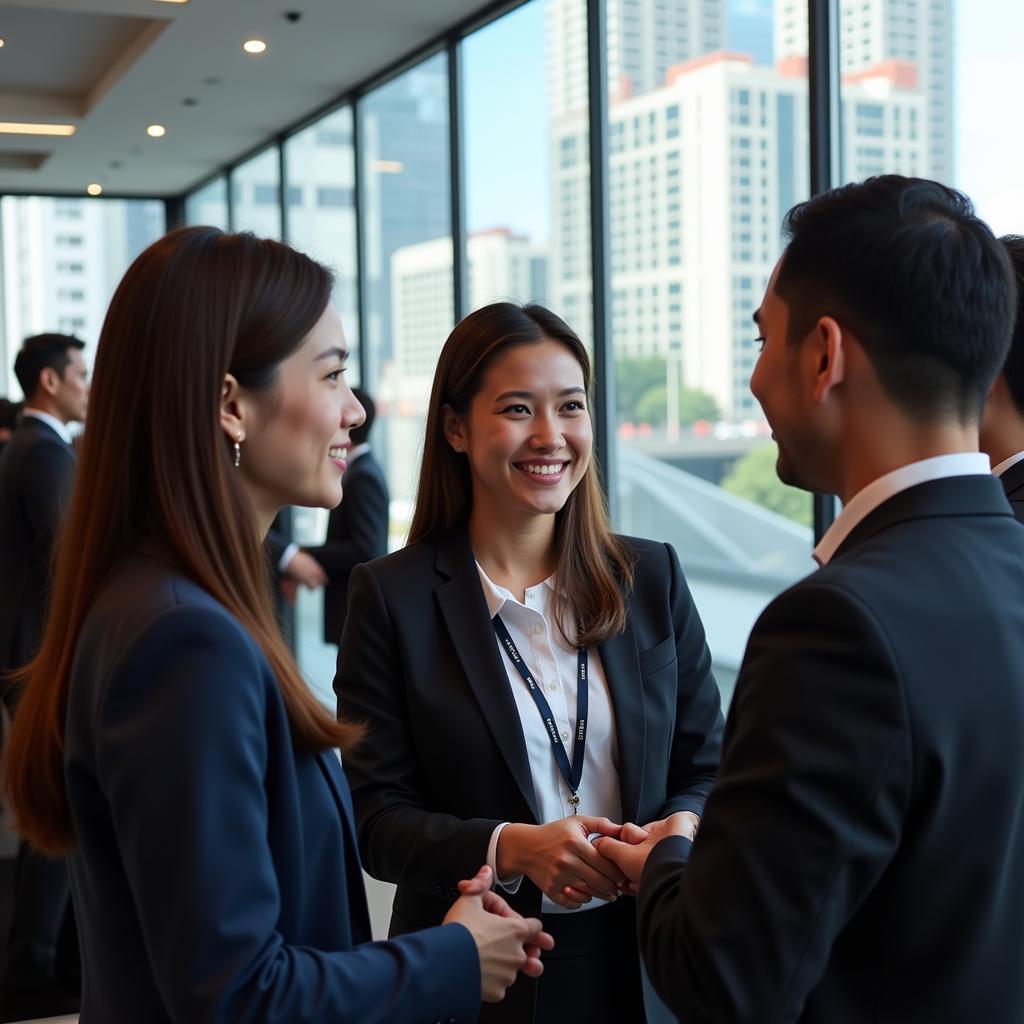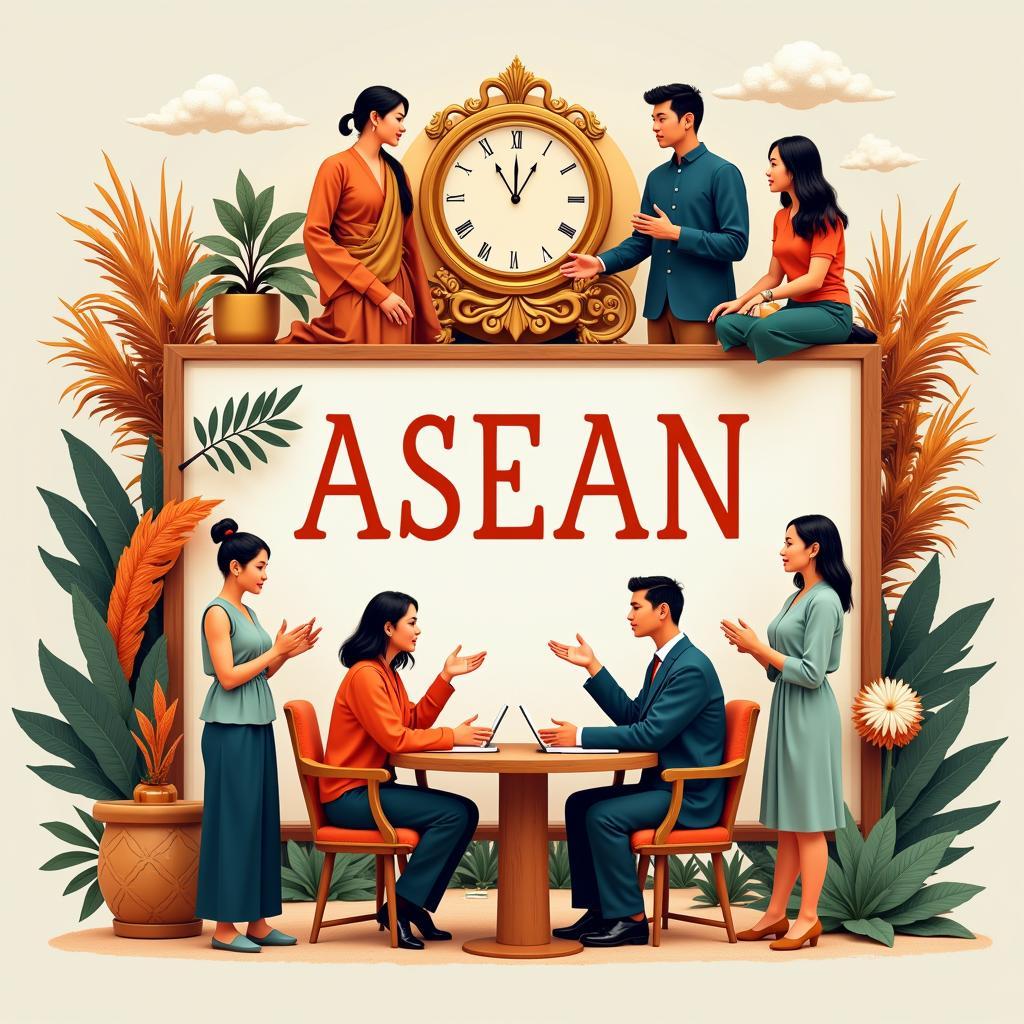Understanding Asean Business Culture is crucial for success in this dynamic region. This diverse market presents unique opportunities and challenges for businesses looking to expand their operations. From communication styles to negotiation tactics, this guide will explore the key aspects of ASEAN business culture.
The Association of Southeast Asian Nations (ASEAN) comprises ten distinct countries, each with its own rich history, traditions, and cultural nuances. However, several shared values and practices shape the business landscape across the region. Learn more about ASEAN by visiting ASE SG. These commonalities, combined with the individual characteristics of each member state, contribute to the vibrant and complex tapestry of ASEAN business culture. Successfully navigating this landscape requires a deep understanding of both the regional commonalities and the specific cultural contexts.
Building Relationships in ASEAN
Relationship building is paramount in ASEAN business culture. Trust and personal connections are often prioritized over purely transactional interactions. Taking the time to cultivate strong relationships with business partners is essential for long-term success. This can involve attending social events, engaging in informal conversations, and demonstrating genuine interest in your counterparts’ personal and professional lives.
The Importance of Face
The concept of “face” is central to many Asian cultures, including those within ASEAN. Maintaining face means upholding one’s reputation, dignity, and social standing. Avoiding actions that could cause someone to lose face is vital. This includes public criticism, direct confrontation, and aggressive negotiation tactics. Instead, prioritize diplomacy, tact, and respect in all interactions.
 Building Relationships in ASEAN Business
Building Relationships in ASEAN Business
Communication Styles
Communication styles in ASEAN tend to be indirect and nuanced. Emphasis is often placed on nonverbal cues and context. Direct confrontation is generally avoided, and disagreements are often addressed subtly. Developing a sensitivity to these nuances is crucial for effective communication.
Negotiating in ASEAN
Negotiations in ASEAN often involve a more collaborative and consensus-based approach. Patience and flexibility are key. Decisions may take longer than in some Western cultures, as building consensus among stakeholders is prioritized.
Understanding Hierarchy
Hierarchy plays a significant role in ASEAN business cultures. Decisions are often made top-down, and deference is shown to senior figures. Be mindful of these hierarchical structures and address senior individuals with appropriate respect. Attending conferences like the ASEA Conference Brisbane can offer valuable insights into navigating the intricacies of ASEAN business dynamics.
The Art of Compromise
Compromise is a core element of negotiation in ASEAN. Be prepared to make concessions and find mutually beneficial solutions. Focusing solely on your own interests may be seen as disrespectful and could hinder the negotiation process.
Cultural Considerations in ASEAN Business
Beyond communication and negotiation, various cultural factors influence ASEAN business practices. These include religious beliefs, social customs, and attitudes towards time and punctuality.
Religious and Social Customs
ASEAN is home to a diverse range of religions, including Islam, Buddhism, Christianity, and Hinduism. Be aware of these religious sensitivities and avoid actions that could be considered offensive or disrespectful. Similarly, familiarize yourself with local social customs, such as greetings, gift-giving etiquette, and dining protocols.
Time and Punctuality
While punctuality is generally valued in business settings, the concept of time can be more flexible in some ASEAN cultures. Delays may occur, and meetings may not always start or end at the scheduled time. Be prepared for these potential variations and avoid showing impatience or frustration.
For technology-driven businesses, understanding the evolving ASEAN market is critical. Learn more about relevant resources by exploring ASE Technologies.
 Cultural Considerations in ASEAN Business Etiquette
Cultural Considerations in ASEAN Business Etiquette
Conclusion
Navigating ASEAN business culture requires a deep understanding of both the shared regional values and the unique characteristics of each member state. By prioritizing relationship building, respecting cultural nuances, and adapting your communication and negotiation styles, you can effectively engage with ASEAN business partners and achieve success in this vibrant market. ASEAN business culture offers a rich and rewarding experience for those willing to invest the time and effort to understand its complexities. Mastering the art of ASEAN business culture will not only open doors to new opportunities but also foster stronger and more sustainable partnerships.
FAQs
- What is the importance of “face” in ASEAN business culture?
- How can I build strong relationships with ASEAN business partners?
- What are some common negotiation tactics in ASEAN?
- How do religious beliefs influence business practices in ASEAN?
- What should I know about time and punctuality in ASEAN?
- How does hierarchy influence decision-making in ASEAN businesses?
- What are some key cultural considerations for doing business in ASEAN?
Common Scenarios and Questions
- Scenario: You are invited to a business dinner in Indonesia. Question: What are the appropriate dining etiquette and customs to observe?
- Scenario: You are negotiating a contract with a company in Thailand. Question: How can you effectively navigate the negotiation process while respecting cultural sensitivities?
- Scenario: You are giving a presentation to a group of business leaders in Vietnam. Question: How should you adapt your presentation style to resonate with the audience?
Further Reading and Related Topics
You might also be interested in learning more about specific ASEAN markets, such as the business landscape in Shanghai. Explore more on ASE Shanghai China. Or if you are looking for specific meetings in the US related to ASEAN, you can find more information on ASE meeting Portland.
Contact Us
For further assistance or inquiries, please don’t hesitate to contact us. Call us 24/7 at 0369020373, email us at aseanmediadirectory@gmail.com, or visit our office in Ngoc Lien Village, Hiep Hoa, Bac Giang, Vietnam. Our dedicated customer support team is always ready to help.